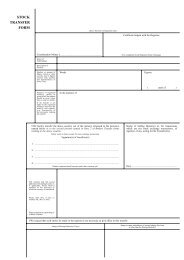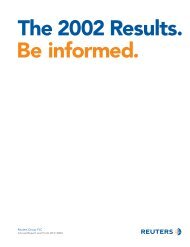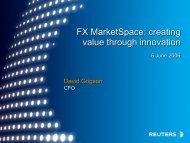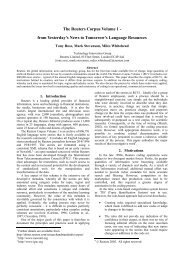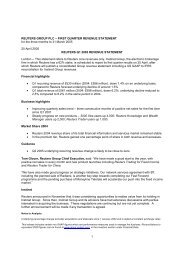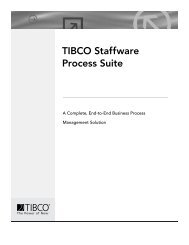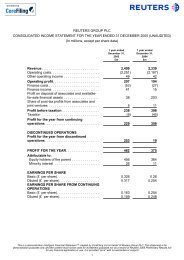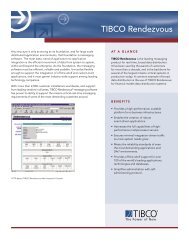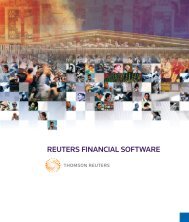Focus and vision for 150 years..... - Thomson Reuters
Focus and vision for 150 years..... - Thomson Reuters
Focus and vision for 150 years..... - Thomson Reuters
You also want an ePaper? Increase the reach of your titles
YUMPU automatically turns print PDFs into web optimized ePapers that Google loves.
OPERATING AND FINANCIAL REVIEW continued<br />
1998 was £51 million of which £5 million was<br />
in respect of associates.<br />
Net gains on disposal were £271 million<br />
compared to £102 million in 1999 <strong>and</strong><br />
£26 million in 1998. A follow-on public offering<br />
in March 2000 of 4.8 million TSI shares resulted<br />
in a book profit <strong>for</strong> <strong>Reuters</strong> of £160 million. This<br />
was subsequently reduced by £3 million as a<br />
result of the exercise of options held by TIBCO<br />
Finance employees. <strong>Reuters</strong> has sold no shares<br />
in TSI other than to meet its obligations under<br />
an option plan of TIBCO Finance, a wholly<br />
owned <strong>Reuters</strong> subsidiary, <strong>and</strong> received no<br />
proceeds from the sale of TSI shares other<br />
than the exercise price of such options.<br />
Profits on disposal of Greenhouse investments<br />
in 2000 were £83 million compared to<br />
£37 million in 1999 <strong>and</strong> £26 million in 1998. The<br />
profit in 2000 was offset in part by a write-down<br />
of £30 million to reflect a decline in the carrying<br />
value of certain investments. No write-downs<br />
were booked in 1999 or 1998.<br />
The disposal of <strong>Reuters</strong> interest in Safetynet<br />
generated a further profit of £37 million in 2000.<br />
Earnings be<strong>for</strong>e interest, taxation, depreciation<br />
<strong>and</strong> amortisation (EBITDA) declined 19% to<br />
£730 million on a normalised basis <strong>and</strong> fell 1% to<br />
£1,001 million on a reported basis. This compares<br />
with a fall in 1999 of 3% on a normalised basis<br />
<strong>and</strong> growth of 5% on a reported basis.<br />
The tax charge <strong>for</strong> 2000 is based on an<br />
effective tax rate of 17% on profit be<strong>for</strong>e<br />
goodwill amortisation, compared with a rate<br />
of 30% in 1999 (31% in 1998) <strong>and</strong> the current<br />
UK corporate tax rate of 30%. The lower<br />
effective tax rate reflects the beneficial tax<br />
consequences of the gain arising from the TSI<br />
follow-on share offer (on which no tax arises)<br />
<strong>and</strong> from tax deductions arising from the<br />
exercise of TSI stock options held by TIBCO<br />
Finance employees. On a normalised basis the<br />
tax rate <strong>for</strong> 2000 was 33%, down from 34% in<br />
1999. Changes to UK legislation affecting UK<br />
based multinationals <strong>and</strong> other adverse mix<br />
effects are expected to add between 1% <strong>and</strong><br />
3% to the Group’s effective rate of tax on<br />
normalised profits.<br />
The final dividend rose to 12.35p which, when<br />
added to the interim dividend of 3.65p per<br />
share, amounts to an increase of 9% <strong>for</strong> the full<br />
year. As announced in February 2000, during<br />
the period of business trans<strong>for</strong>mation, <strong>Reuters</strong><br />
dividend policy will be aligned to the results<br />
of <strong>Reuters</strong> Financial, which comprises <strong>Reuters</strong><br />
In<strong>for</strong>mation <strong>and</strong> <strong>Reuters</strong> Trading Solutions<br />
di<strong>vision</strong>s.<br />
Basic earnings per share grew by 26% in 2000<br />
compared to an increase of 13% in 1999.<br />
Normalised earnings per share decreased 22%<br />
in 2000 compared to a 5% decrease in 1999.<br />
Business trans<strong>for</strong>mation<br />
Trans<strong>for</strong>mation initiatives have been categorised<br />
into two groups:<br />
The development of a new product<br />
architecture that will create new personalised<br />
products <strong>for</strong> existing <strong>and</strong> new users along a<br />
continuum of price points that offer lower cost<br />
of ownership, segmented service <strong>and</strong> support,<br />
<strong>and</strong> a customer focused <strong>and</strong> rapid approach<br />
to product development.<br />
Organisation <strong>and</strong> process trans<strong>for</strong>mation<br />
that will create an organisation structure that<br />
is aligned to the emerging opportunities in<br />
each of our different customer segments<br />
supported by web-enabled internal systems<br />
<strong>and</strong> processes that maximise the economies<br />
of our global scale.<br />
Expenditure on business trans<strong>for</strong>mation was<br />
£139 million in 2000 compared to an original<br />
estimate of £<strong>150</strong> million. This was made up of<br />
£88 million on new product architecture <strong>and</strong><br />
£51 million on organisation <strong>and</strong> process<br />
trans<strong>for</strong>mation. Costs in 2000 were incremental<br />
to the existing base <strong>and</strong> included expenditure<br />
on consultants, contractors <strong>and</strong> severance.<br />
<strong>Reuters</strong> anticipates further costs of £<strong>150</strong> million<br />
in 2001 <strong>and</strong> is committed to delivering<br />
£<strong>150</strong> million of savings to the bottom line by 2003,<br />
with a majority of the savings expected to flow<br />
through to profit <strong>and</strong> operating margins in 2002.<br />
Research <strong>and</strong> development<br />
Research <strong>and</strong> development expenditure<br />
totalled £276 million in 2000 compared with<br />
£197 million in 1999 <strong>and</strong> £200 million in 1998.<br />
This expenditure excludes costs associated<br />
with business trans<strong>for</strong>mation. Of the total<br />
expenditure, £152 million related to <strong>Reuters</strong><br />
Financial (1999: £146 million), £27 million to<br />
<strong>Reuters</strong>pace (1999: £5 million), £81 million<br />
to Instinet (1999: £41 million) <strong>and</strong> a further<br />
£16 million (1999: £5 million) related to the<br />
Chief Technology Office (CTO).<br />
Activities in 2000 included enhancements<br />
to the data capture systems; redesign of<br />
the client-facing interface at Instinet; further<br />
development of the Fixed Income <strong>and</strong> retail<br />
products at Instinet; the retail Personal Finance<br />
portal; <strong>and</strong> corporate security <strong>and</strong> software<br />
process improvements by the CTO.<br />
Cash flow<br />
REUTERS<br />
FINANCIAL REUTERSPACE INSTINET TOTAL<br />
£M £M £M £M<br />
Operating profit 517 (67) 157 607<br />
Depreciation 216 14 46 276<br />
Capex (190) (20) (64) (274)<br />
Working capital<br />
movements (10) 11 44 45<br />
Di<strong>vision</strong>al cash<br />
flow 533 (62) 183 654<br />
Cash conversion 103% (93%) 117% 108%<br />
Business<br />
trans<strong>for</strong>mation (97)<br />
Acquisitions/<br />
Investments (463)<br />
Disposals 145<br />
Dividends (205)<br />
Taxation (159)<br />
Other 50<br />
Net movement (75)<br />
Di<strong>vision</strong>al cash conversion is the percentage<br />
of di<strong>vision</strong>al operating profit, be<strong>for</strong>e business<br />
28 <strong>Reuters</strong> Group PLC Annual Report <strong>and</strong> Form 20-F 2000



